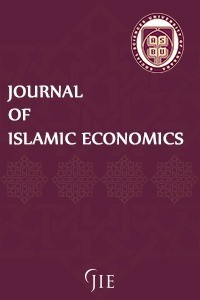İsrail Vergi Politikaları ve Kudüs Şehrindeki Filistinlilerin Sosyo-Ekonomik Gerçekliği
Çalışma, seçilen ekonomik ve sosyal göstergelerin gözden geçirilmesi yoluyla Kudüs'teki Filistin nüfusunun yaşadığı sosyo-ekonomik gerçekliği ve İsrail'in Kudüslülere uyguladığı vergi türlerinin gözden geçirilmesidir. Çalışma, Filistin Merkez İstatistik Bürosu tarafından yayınlanan raporlar, İsrail Merkez İstatistik Dairesi raporları ve bu alanda yayınlanan makaleler gözden geçirilerek betimsel analitik yaklaşıma dayandırılmıştır.
Çalışmanın en önemli sonuçları, Kudüs'teki Filistinli sakinlerin şehirdeki Yahudi nüfusundan daha düşük bir yaşam standardında yaşadıkları, ancak diğer Filistinlilerden daha iyi bir ekonomik yaşam standardıyla yaşadıklarıdır. İsrail’in Kudüs'teki Filistinlilere uygulanan konut ruhsat ücretleri ve vergilerle ilgili politikaları yaşam koşullarını zorlaştırmaktadır. Bu politikalar genellikle Filistinlileri sınır dışı etmeyi, ticarethanelerini kapatmayı ve yerine Yahudi sakinleri yerleştirmeyi hedeflemektedir.
Çalışmanın en çok öne çıkan önerileri, turist kafilelerini Kudüs'ün Arap bölgelerini ziyaret etmeye teşvik etmek, Kudüs ürünlerini desteklemek için kampanyalar başlatmak, Filistin bankalarından imtiyazlı krediler vererek Doğu Kudüs'e doğru yatırımları teşvik etmek ve son olarak Kudüslüleri desteklemek için bir mali fon oluşturmaktır.
Anahtar Kelimeler:
Kudüs, Filistin, İsrail Politikaları, Ekonomik Gerçeklik, Sosyal Gerçeklik
The socio-economic conditions of the Palestinians In Jerusalem
The study aims to identify the economic and social reality of the Palestinian population in Jerusalem by reviewing selected indicators, as well as the most prominent types of taxes imposed on Jerusalemites. The study relied on the descriptive analytical approach through documents published by the Palestinian Central Bureau of Statistics, as well as the Central Statistical Service "Israel", and studies published in this area.
The study found a series of findings, most notably that the Palestinian population of Jerusalem lives at a lower standard of living than the Jewish population of Jerusalem, but theoretically better than the living standard of the rest of the Palestinian population, but that preference runs counter to policies and actions. "Israel", which applies to housing licence fees and multiple taxes imposed on Palestinians and reflects the large gap between the Palestinian and Jewish population in the city, often aiming at deporting the Palestinian population, closing their business interests and replacing them with Jewish residents.
The study recommended promoting the resilience of Jerusalemites and helping them to preserve the Jerusalem identity by encouraging tourist delegations of Palestinian diaspora and inland Palestinians with access to the city, launching campaigns to support Jerusalem products, and boycotting products "Israel", and working to establish a mechanism through the Palestinian Monetary Authority and Palestinian banks to enable such banks to grant loans on concessional terms to invest in East Jerusalem, and finally allocate a financial fund to support Jerusalemites in paying their accumulated taxes and providing them with development projects, to which the Palestinian Authority, Arab and Islamic States, as well as capable expatriate Palestinians, contribute.
Keywords:
Jerusalem Al-Quds, Palestine, Israel Policies, Economic Reality, Social Reality,
___
- بلدية القدس (2021). "أسئلة وأجوبة حول رسوم التحسين". تم الاسترجاع من الرابط https://www.jerusalem.muni.il/ar/residents/planningandbuilding/bettermenttaxes/frequentlyaskedquestions/
- الجهاز المركزي للإحصاء الفلسطينية (2017). "مسح إنفاق واستهلاك الأسر الفلسطينية". رام الله، فلسطين. تم الاسترجاع من الرابط https://www.pcbs.gov.ps/Downloads/book2368.pdf?date=7_5_2018
- الجهاز المركزي للإحصاء الفلسطيني (2022). "كتاب القدس الإحصائي 2022". رام الله، فلسطين. تم الاسترجاع من الرابط https://www.pcbs.gov.ps/Downloads/book2609.pdf دائرة الإحصاء المركزية "الإسرائيلية" (2019). "بيانات مسح إنفاق الأسرة في "إسرائيل"". القدس، "إسرائيل".
- دحلان، أحمد (2013). "الصراع الإسرائيلي-الفلسطيني على المكان في مدينة القدس- دراسة جيوبوليتيكية". مجلة الجامعة الإسلامية للبحوث الإنسانية مجلد 21، رقم العدد 2 (2013): 315-361. تم الاسترجاع من الرابط https://www.researchgate.net/publication/275015539_alsra_alasrayyly-_alflstyny_ly_almkan_fy_mdynt_alqds_drast_jywbwlytykyt#fullTextFileContent
- الرجوب، عوض (2016). "ضرائب الاحتلال ترهق جيوب المقدسيين". موقع الجزيرة. تم الاسترجاع من الرابط https://2u.pw/MG8t8X
- زايد، وليد (2018). "الجدار العنصري حول القدس واقعه ودوافعه". مركز رؤية للتنمية السياسية، إسطنبول- تركيا. تم الاسترجاع من الرابط https://2u.pw/d00UWW سلطة الضرائب في "إسرائيل" تم الاسترجاع من الرابط https://www.gov.il/ar/departments/israel_tax_authority/govil-landing-page
- شعت، شوقي (1988). "القدس الشريف"، شركة بابل للطباعة والنشر.
- الطحان، امتنان (2020). "الاقتصاد المقدسيّ مِن الازدهار إلى الانهيار"، مركز القدس. تم الاسترجاع من الرابط https://cutt.us/HVCM2
- كل الحق (2023). "رسوم سلطة البث (رسوم التلفزيون)". تم الاسترجاع من الرابط https://cutt.us/KhNVk
- كورح، ميخال وحوشين، مايا (2019). "معطيات عن القدس 2019- الوضع القائم واتجاهات التغيير". معهد القدس لبحث السياسات، القدس. تم الاسترجاع من الرابط https://jerusaleminstitute.org.il/ar/publications/facts_and_trends_2019/
- كورح، ميخال وحوشين، مايا (2021). "معطيات عن القدس 2021- الوضع القائم واتجاهات التغيير". معهد القدس لبحث السياسات، القدس. تم الاسترجاع من الرابط https://jerusaleminstitute.org.il/ar/publications/facts-and-trends-2021/
- محسن، سميح (2007). "جدار الضم .. آخر حلقات مسلسل تهويد القدس". تسامح. مركز القدس للحقوق الاقتصادية والاجتماعية، "ضريبة الأرنونا ". تم الاسترجاع من الرابط http://www.jcser.org/arabic/?p=92
- مركز المعلومات الإسرائيلي لحقوق الإنسان في الأراضي المحتلة "بتسليم" (2017). القدس. تم الاسترجاع من الرابط https://www.btselem.org/arabic/jerusalem
- موقع الجزيرة (2018). "أسباب بطالة الشباب في القدس". تم الاسترجاع من الرابط https://cutt.us/Oz5z9
- مؤسسة التأمين الوطني (2021). "رسوم التأمين الوطني". تم الاسترجاع من الرابط https://www.btl.gov.il/Arabic%20HomePage/Pages/default.aspx
- وكالة معاً (2018). "أبرز ضرائب الأرنونا المفروضة على المقدسيين". تم الاسترجاع من الرابط https://www.maannews.net/news/938418.html
- Başlangıç: 2021
- Yayıncı: Ankara Sosyal Bilimler Üniversitesi
Sayıdaki Diğer Makaleler
Islamic Finance: Fit for Purpose or Mere Replication?
İsrail Vergi Politikaları ve Kudüs Şehrindeki Filistinlilerin Sosyo-Ekonomik Gerçekliği
İslami Finans Standartlarının Fıkhi Dayanakları
Kredi Garanti Fonu’nun İslam İktisadı ve Fıkıh Açısından Değerlendirilmesi
TÜRKİYE’DE TEDARİKÇİ FİNANSMANI VE KATILIM BANKACILIĞI UYGULAMASI
